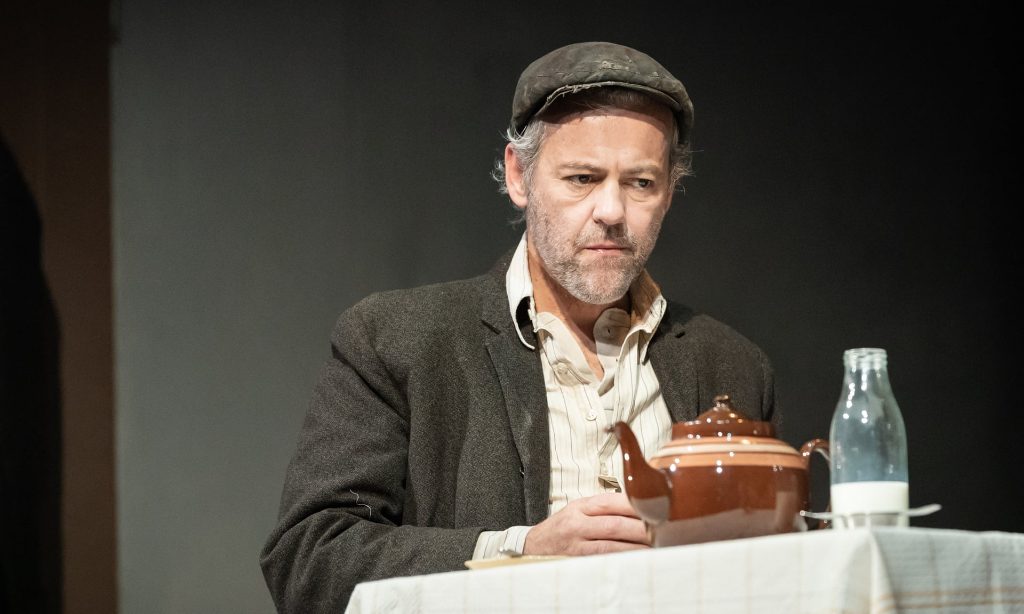Pinter Five and Six at the Harold Pinter Theatre

Patrick Marber directs Pinter Five, which amalgamates Harold Pinter’s first play The Room (1957), when his iconic sinister silence and suggestive undertones of critiques are already present, with later plays Victoria Station (1982) and Family Voices (1981).
As we approach the possibility of an isolating Brexit, The Room resonates with the present climate of a deep fear of the other, which leaves one imprisoned within the confines of the small space. Jane Horrocks’s nervous and fidgety Rose Hudds creates an uncomfortable space in which her endless flow of mundane words highlights the silent violence of her husband (Rupert Graves). As soon as Mr Hudds leaves the room, his wife receives a number of odd visitors who serve to confirm her suspicions of the outside world, only to be enticed by a blind man (Colin McFarlane) – bringing a message from her father – to recall a world that she has long neglected. The violent repercussions of such a mission are echoed in the second play, Victoria Station, where Graves portrays a disoriented cab driver whose absence of mind is caused by the presence of a girl at the back of his taxi. Though experienced, he does not seem to recall where Victoria Station is or where he is in that space and time. This ominous story is pronounced with a haunting performance by Graves, especially when juxtaposed with the hilarious confusion of the cab controller (McFarlane).
The last of the series of Pinter Five is Family Voices, initially written as a radio play. It depicts a conversation between mother and son – later joined by the narrative of the deceased father (Graves) – through unsent letters where each speak as if against the other. As the son (Luke Thallon) claims to be missing his mother (Horrocks), she questions if he is thinking of her at all. This hypothetical leap through space appears to be thematic of the acts comprising Pinter Five in the way in which space is invaded in The Room and the disconnection from space in Victoria Station.
Party Time and Celebration: Pinter Six depict how two groups of people come into wealth, exposing their relationships with themselves, their partners and their family members. Party Time shows a dull party of etiquette and prestige, hinting at political power given the suggestion that there might be a protest outside. Celebration resonates with the image of the mafia where the change of costume and role-play does not alter the banality of etiquette. Pinter’s theatre of the absurd satirises the absurdities of a being that is to be perceived, which Jamie Lloyd captures perfectly in the profound silences and the distance gazes that force the spectator to reflect upon the faces behind the masks.
A Soutra Gilmour set leaves both groups of people sitting markedly distant from each other, adding to the fact that what is unsaid grips theatregoers with many questions. The first group – all dressed in black – are all facing the audience in a straight row, while the second ensemble occupy a table at a restaurant where the young couple sit on two extremes of the long table, and the other couple – whose wedding anniversary they are celebrating – are separated by a third pair sitting in between them. This gap in intimacy is also present in the conversations in which love unites with the grand passion of the materialistic mind – power – such that marriage becomes an activity of domination. In Party Time Dusty’s (Eleanor Matsuura) incessant questioning for the whereabouts of her brother Jimmy (Abraham Popoola) leads her husband Terry (John Simm) to furiously and publicly demand her silence. She wonders if he is likely to kill her later and his agreement leads to the only point in which the couple bond in physical intimacy.
The monotony of the dull role-playing is broken by Jimmy in Party time and the waiter in Celebration; both characters are played by Abraham Popoola, whose presence as the only person of colour also makes relevant interjections to the politics of the globalised present in which the western hegemony exists in nostalgia of its colonial past. Dusty’s repeated questioning prompts the host, Gavin (Phil Davis), to suggest that the problem with the modern world is that men cannot control their wives, while he later boasts of holidaying on an island where there is no one around but a few locals whom he does not regard at all. Uniting the criticisms of the modern world that continue to favour white male figures of power and that render the pleas of the gendered other as less important, this play is perfectly situated, socio-politically relevant, dramatically pleasurable and profoundly thought-provoking.
Marissa Khaos
Photo: Marc Brenner
Pinter Five and Six is at the Harold Pinter Theatre from 13th December until 26th January 2019. Book you tickets for Pinter Five here.
























Facebook
Twitter
Instagram
YouTube
RSS